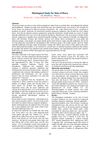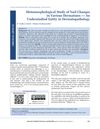 April 2023 in “Journal of Cosmetic Dermatology”
April 2023 in “Journal of Cosmetic Dermatology” There's no strong link between Alopecia Areata, a hair loss condition, and fatty liver, but more research is needed.

The study concludes that long COVID recovery involves time, various treatments, and a strong patient-provider relationship.
 March 2023 in “Journal of clinical review & case reports”
March 2023 in “Journal of clinical review & case reports” Frontal Fibrosing Alopecia mainly affects postmenopausal Mexican women, requiring early detection to prevent permanent hair loss.
 March 2023 in “Cellular Molecular and Biomedical Reports”
March 2023 in “Cellular Molecular and Biomedical Reports” The study found that heart disease is common in people with PCOS and that being overweight is a major risk factor; lifestyle changes and medication are important for management.

The study aims to create a model to improve personalized and preventive health care.
 March 2023 in “International Journal of Trichology”
March 2023 in “International Journal of Trichology” Using both minoxidil and finasteride together is more effective for male hair loss than using either one alone.
 February 2023 in “Han'gug miyong haghoeji/Journal of the Korean society of cosmetology”
February 2023 in “Han'gug miyong haghoeji/Journal of the Korean society of cosmetology” Aroma essential oils in shampoo may help prevent hair loss and promote hair growth.
 February 2023 in “Archives of Dermatological Research”
February 2023 in “Archives of Dermatological Research” Laser treatment, especially when combined with other therapies, is effective for hair regrowth in alopecia areata.
 February 2023 in “Global journal of health sciences and research”
February 2023 in “Global journal of health sciences and research” Zinc levels are not significantly linked to the presence or severity of alopecia areata.
 February 2023 in “Mağallaẗ Tikrīt li-l-ʻulūm al-ṣirfaẗ/Tikrit journal of pure science”
February 2023 in “Mağallaẗ Tikrīt li-l-ʻulūm al-ṣirfaẗ/Tikrit journal of pure science” Horse skin has a layered epidermis, a dermis with hair follicles, sweat and sebaceous glands, and is supplied by small arteries.
 February 2023 in “International Journal of Medical Arts”
February 2023 in “International Journal of Medical Arts” Trichloroacetic acid is a safe and effective treatment for hair loss in alopecia areata patients.
 January 2023 in “Research Square (Research Square)”
January 2023 in “Research Square (Research Square)” Many workers in mines, textile, and food factories have skin mites, with textile workers having the most, and women more than men.
 January 2023 in “Frontiers in bioscience”
January 2023 in “Frontiers in bioscience” Artemis protein may help control hair growth and health by influencing cell processes.
 January 2023 in “Research Square (Research Square)”
January 2023 in “Research Square (Research Square)” Many patients experienced severe hair loss after COVID-19, especially older adults and women.
 January 2023 in “Journal of Cutaneous Pathology”
January 2023 in “Journal of Cutaneous Pathology” The study found certain scalp biopsy features can help tell apart alopecia areata from pattern hair loss even when typical immune cells are not seen.

DOPE:DOPC liposomes can improve targeted cancer drug delivery, reducing side effects and increasing effectiveness.
 January 2023 in “International journal of homoeopathic sciences”
January 2023 in “International journal of homoeopathic sciences” Homeopathic remedies can help manage PCOS symptoms in girls aged 17-21.

Both trichoscopy and folliscopy accurately diagnose telogen effluvium, but trichoscopy is easier and faster.
 January 2023 in “Indian Journal of Dermatology”
January 2023 in “Indian Journal of Dermatology” The study found that Frontal Fibrosing Alopecia in North-East India mainly affects middle-aged women and is often associated with lichen planus pigmentosus.
January 2023 in “Journal of Clinical and Diagnostic Research” Trichoscopic patterns often overlap in scalp disorders, so dermatologists need to stay updated.
 December 2022 in “Pakistan Journal of Medical and Health Sciences”
December 2022 in “Pakistan Journal of Medical and Health Sciences” Tofacitinib effectively treats Alopecia Areata.

Social media data can help track and predict COVID-19 symptoms and trends.
 December 2022 in “International journal of drug regulatory affairs”
December 2022 in “International journal of drug regulatory affairs” The US and EU lead in cell and gene therapy regulations with more approvals and clinical trials, while India is in early stages with fewer approvals and expedited processes.
 December 2022 in “Journal of medical sciences and health”
December 2022 in “Journal of medical sciences and health” Examining nail biopsies is useful for diagnosing nail diseases.
 December 2022 in “The Indian journal of chest diseases & allied sciences”
December 2022 in “The Indian journal of chest diseases & allied sciences” Women with PCOS often have sleep problems, including sleep apnea, which are linked to obesity and depression.
November 2022 in “Liberal Arts Innovation Center” Spirulina extract may help protect the scalp and improve hair growth.
 November 2022 in “bioRxiv (Cold Spring Harbor Laboratory)”
November 2022 in “bioRxiv (Cold Spring Harbor Laboratory)” Using deep learning to predict gene expression from images could help assess colorectal cancer metastasis.
 November 2022 in “The journal of investigative dermatology/Journal of investigative dermatology”
November 2022 in “The journal of investigative dermatology/Journal of investigative dermatology” The study found markers indicating that cells responsible for hair color are differentiating in specific areas of the hair follicle.
 November 2022 in “Journal of Investigative Dermatology”
November 2022 in “Journal of Investigative Dermatology” KX-826 is safe and effectively increases hair count in men with hair loss.
 November 2022 in “International Journal of General Medicine”
November 2022 in “International Journal of General Medicine” Women with Polycystic Ovary Syndrome are more likely to have Non-Alcoholic Fatty Pancreas Disease, which is associated with older age, metabolic syndrome, insulin resistance, and high male hormone levels.




























